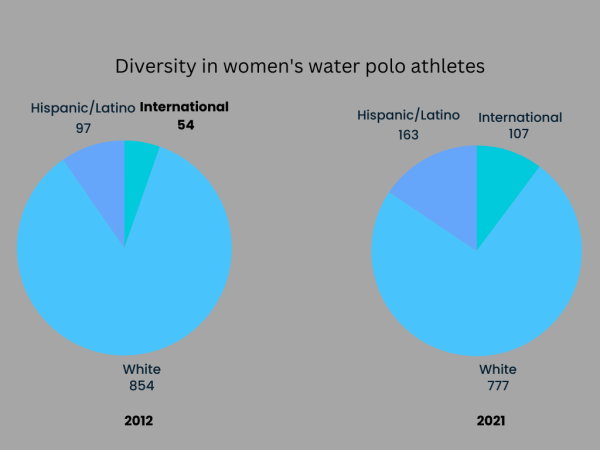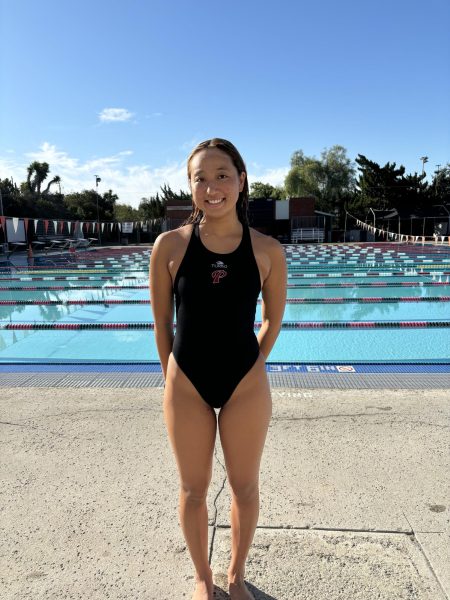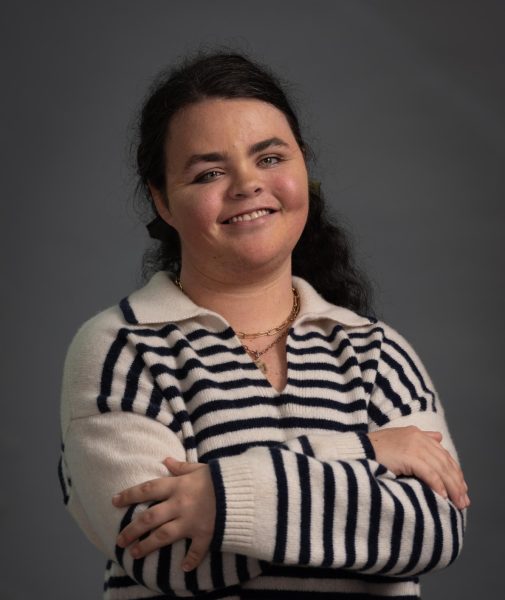Throughout the nation, diversity has impacted athletes in water polo making it difficult to recruit individuals with different backgrounds and ethnicities.
One of the main challenges with water polo is that the athletes need consistent access to a pool, which can be a significant cost that many can’t afford.
According to the Collegiate Water Polo Association, there has been an increase in Hispanic/Latino and international athletes in the sport.

Created by Taylor Leonard
At Palomar, the women’s water polo team has a range of athletes from different ethnicities who are supportive of one another in the water.
Athlete Sophia Wicks said, “Our team has Asian, American, African American, Mexican, and even someone from Japan.”
When asked about her challenges facing diversity in water polo, Wicks mentioned that it’s a difficult sport for athletes to play and that is rare to find people with similar backgrounds on the same team.
Another player, Ayano Tsuda, who is an international athlete from Japan, mentioned how encouraging the team is to her regardless of where she came from.

“We have a really good team that supports one another, giving advice to each other, and also if someone has a program or something we all tag along together,” said Tsuda.
Throughout the challenges of adjusting Tsuda described how the motivation from the coach and family members has made the transition from Japan to Palomar easier than she expected.
Tsunda said, “I think it’s all my environment, my friends and family along with the coach that has helped me with the transition.”
In regards to diversity, head coach Mandy Simon makes sure the athletes feel comfortable on the team by creating a space where the players can talk to each other without judgment.
“I try to keep a neutral stance on a lot of different things and my own personal belief is to treat everyone as humans, rather than dividing bringing people together,” said Simon.
When asked about improvement here at Palomar with diversity, Wicks mentioned that there should be more recruiting of athletes of different ethnicities and similar backgrounds.
Wicks said, “I think just telling athletes that Palomar exists and there are sports that would like them. I mean in high school, I didn’t even think that there was an opportunity for me to play water polo through college but my other friends did.”
The United States of America Water Polo program is committed to create an environment where athletes feel comfortable embracing different cultures and ethnic backgrounds.
According to the USA Water Polo,”Inclusion is about valuing all individuals, providing equal opportunity to all and removing any real or perceived barriers to involvement.”
In Addition, the United States of America’s water polo team has become more diverse the past couple of years with Ashleigh Johnson being the first African American in the sport.
According to National Public Radio article, “Like, I play this game differently. I look differently than most people in my sport, and I even approach my preparation a little bit differently than most people and have a different mindset. And those things made me feel weird when I was young. But now they’re my strengths. So I tell a lot of kids who tell me that they don’t feel like they fit into their team — I’m like, ‘You keep being you. Your difference makes you great. Your uniqueness is an add, and it takes all types.”
Check out our previous story on diversity in water polo here.
To read more about diversity in water polo, check out this website.


